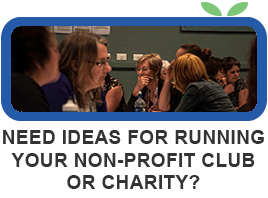Last updated April 24, 2017
The term Social Enterprise has become wildly popular over the last few years, and is regularly referred to as a business model in both the non-profit and for-profit worlds. However, google a definition for Social Enterprise and you’ll return over 7,000,000 results; not all of which are the same.
While Social Enterprises have been around for decades, agreement over what constitutes a Social Enterprise is an ongoing discussion. Some hold fast to the concept of community co-ops and believe the only true Social Enterprises are the ones owned by the community, for the community. Some use the term Social Enterprise for any money-making venture established by a charity – regardless of whether the venture itself provides any social benefit. And then there are those who use the term to describe any business that holds philanthropy as a core value. No wonder people are confused.
In New Zealand there are people who sit in all of these camps. However, one definition that is widely accepted in the Social Enterprise discussion is that which is provided by the Finding Australia’s Social Enterprise Sector Project. They say Social Enterprises are organisations that:
- Are led by an economic, social, cultural or environmental mission consistent with a public or community benefit;
- Trade to fulfill their mission;
- Derive a substantial portion of their income from trade; and
- Reinvest the majority of their profit / surplus in the fulfillment of their mission.
In other words, a Social Enterprise is something that trades (buys, sells, hires, rents) goods or services, and the act of trading those goods and services provides some form of genuine community benefit, other than raising money.
So where does that leave non-profit organisations that want to operate in the Social Enterprise space? My suggestion is not to get hung-up on definitions and instead simply explore opportunities to generate an income through trade, while at the same time using that trade to increase the impact you have in the community. That doesn’t mean you have to operate your whole organisation in a Social Enterprise model. In fact, it’s a good idea to start with a single small initiative and see how it goes.
Are you ready for Social Enterprise?
Increasingly New Zealand non-profits are introducing the idea of ‘trade’ into the way they do business, and therefore are nudging at the edges of Social Enterprise without even realising it. They may charge fees for people to attend their programmes or use their services. Perhaps they operate a resource library or rent equipment that is not otherwise available for their service users. Many organisations have established op-shops as a way of funding their operations, and while the shop itself may not have a direct link to their mission, it does provide community benefit by way of raising funds.
For organisations who are already in this trading space, stepping into the world of Social Enterprise is not such a big move. However, if your organisation still relies solely on grants and donations, you need to make sure you are properly prepared before you take the plunge. Some things you need to have in place include:
Time and Money
Setting up a Social Enterprise, even a small one, can take a great deal of time and resources. Depending on the size or scale of your idea, you can easily spend 200 hours or more in the research and preparation phase. Do you have staff available to spend time on this initiative or can you afford to contract someone to do the work? Do you have some budget set aside to invest in the process and start-up requirements? Trying to establish a Social Enterprise with limited time and money is only setting yourself up for failure.
A High Functioning Board
While Social Enterprises have primarily social objectives, they are still driven by market forces. In order to be successful you must be able to make quick decisions in response to changes in the marketplace. Does your organisation have of a clear understanding of management / governance roles, and an agreed process for making quick decisions? Do you have trustees with specific business skills you can utilise in a Social Enterprise setting? In order for any Social Enterprise to work, you will need competent trustees at the helm.
Team Support
Not everyone agrees that Social Enterprise has a place in providing community services, and those who are against the idea are usually loud and persistent in their objections. If you have team members who fall into this category, you need to do some work to get them on-side first. Otherwise you run the risk of any initiative constantly being sabotaged.
Some of the most common concerns people have about incorporating Social Enterprise into their service model are:
- Financial Risk. What if the enterprise is unsuccessful and we lose lots of money?
- Loss of Focus. What if we lose focus on the real reason we exist?
- Donor Perception. What if we turn off donors because they think we’re too like a business?
- Diminished Values. What if we lose our values in trying to make a profit?
- Client Expectations. What if the people who need our services can’t afford to pay?
Find out what the key objections are for people in your team, and then actively address their concerns. Often their fears are due to a lack of information or a misunderstanding of what Social Enterprise is all about. Take some time to answer their questions and involve them in the thinking process. You’ll be amazed by how much of a difference that makes.
What’s the big idea?
If your organisation is ready to step into the Social Enterprise space, you’ll need to decide what sort of Social Enterprise you want to create. The most successful initiatives are ones that link directly with your current vision and mission, and will ultimately compliment the programmes and services you already offer.
A good place to start is to consider your existing client base. What needs do they have that are not currently being met by you or anyone else? Have you ever heard them say “Does anyone know where I can buy…?” or “I wish someone offered a service to…” These statements are excellent indicators as to where there is a gap in the market and they are definitely worth looking into.
It is also useful to consider enterprises that are being run by similar organisations in other regions. Is there something you could adapt to suit your own client base, or do you have an existing service that you could adapt to suit a different market? How can you package up your skills, knowledge and expertise so that it becomes a saleable product?
The important thing to remember is that your first idea is unlikely to be your best idea. Be prepared to brainstorm a whole host of opportunities before deciding on one or two you want to explore some more, and involve as many stakeholders as you can in the brainstorming process. Too many organisations take the first idea they come up with and miss the gold that is waiting a few ideas down the track.
Now what?
Once you’ve settled on an idea or two, it’s important to run them through a few tests and do some in-depth thinking around their feasibility. Find out if a paying market really does exist for your idea, or are you just ‘wishful thinking’? Do some surveys. Interview potential customers. Browse the internet for similar products or services. Talk to people who have tried to launch similar initiatives and failed. What went wrong and what will you need to do better?
If your idea is a small initiative with minimal outlay and risk, you might want to run a ‘pilot project’ as a way to gauge market interest and iron out any bugs. Identify a group of people that are willing to trial the product or service and give you feedback as a way of testing the market. Run the numbers – how many do you have to sell and at what price to make it worthwhile? Is that do-able or just ‘pie-in-the-sky’?
A word of caution though. Many a good idea was lost (or taken) because the instigator wanted to get everything perfect before launching their initiative. It will never happen.
Regardless of how long you spend researching, planning and preparing, you’ll always find things that need to be improved once your enterprise is underway. The most important thing is to have a process in place so you can do regular reviews and make improvements as you go along. Define what success looks like right from the start, and then keep adjusting things to stay on track.
Like any other aspect of your organisation, establishing a Social Enterprise has both risks and benefits. It is not necessarily a silver bullet for all your funding woes, but neither is it the risky business some people believe it to be. Do your homework. Ask lots of question. And if it seems like a good fit for your cause, give it a try.
Kerri Tilby-Price
Kerri is a Facilitator / Trainer with Exult and has over 20 years experience working in and for the community sector.
If you think this article would be useful for your members, you are welcome to use it on your website or in your newsletter. We just ask that you let us know where it is being used, and that you acknowledge our website at the bottom of the article. If you are using the article online, please include a link to our homepage.




